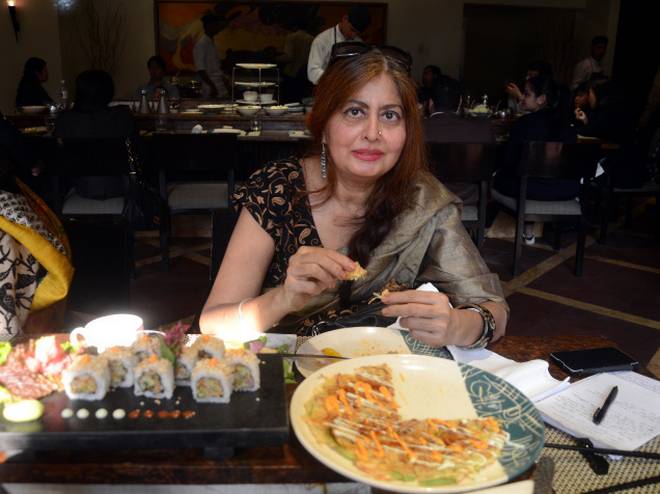Lucknow, UTTAR PRADESH / NEW DELHI :

Humra Quraishi mulls over her long friendship with the Dagar family
She’s had the courage to live in and report from the violence torn Kashmir Valley, but the memories of grief stricken mothers and orphaned children leave her struggling for weeks after she returns to the Capital. When you meet Humra Quraishi, journalist and author, it’s not difficult to figure out how come she’s such a combination of the hard and the soft. She’s the lady in whose home meat has always been cooked, but who doesn’t taste it beyond the shorba (gravy), and who “can’t see raw meat”.
Meeting us at TK’s, the Oriental cuisine restaurant at the Hyatt Regency in South Delhi for lunch and a chat, Humra, she who has lived alone in a conflict zone, is nervous! Because, comfortable as she may be with the pen, she says she’s no good with chopsticks. But never mind. Chef Amit Rohilla, who has designed the new menu for TK’s, has everything under control. Not only are there forks available for desis like us, he also has a line up of vegetarian delights for our guest.
True to her varied colours, Humra’s two latest books are from two ends of the spectrum of human experience. While one is a coffee table book on the Dagars, known as the first family of Dhrupad, the other is a novel, “Meer” (Rupa) set amid the Kashmir conflict.
As Chef Amit personally sees to the dishes being cooked at the live grill fronting our table, the conversation shifts between the melody and malady of human existence. That a novel should have eventually emerged from her years of covering Kashmir is not surprising. But a history of classical music and musicians?
“Dagars & Dhrupad” (Niyogi Books) is the result of a relationship that began over three decades ago. “I heard them (the Dagar Brothers) in the early ‘80s in the home of the ambassador of Qatar to India,” she explains. Remarking she’s not an expert –– “not on anything” –– Humra says she nevertheless found it was “something that touched your soul.”
She began meeting Ustads Faiyazuddin and Zahiruddin Dagar at their residence in Delhi’s Nizamuddin. Over the years, in that simple, welcoming flat, she met various members of the clan spread over different parts of the country, and a number of newspaper interviews were published.
“One day I was clearing all my papers. I thought, I have so much material, I could do a book. Then I asked Wasif (well known vocalist Ustad Wasifuddin Dagar, son of Faiyazuddin). He said he would have to ask his mother.”
A plate of vegetable yakitori, with tri-coloured bell pepper, cottage cheese and onion, accompanies this warm tale of a close knit family. Not only did the ustad seek a go-ahead from his mother, his sisters and his students too, he left the author free to interact with them. After all, as she points out, “Once you do a book you have to look at all possible details.” However, she adds, “The forte of the book is the pictures.”
The entire family, says Humra, beginning with the elders Faiyazuddin and Zahiruddin sahab, have an air of affectionate simplicity. “They didn’t seem the sermonising type. I’m not into frilly things. And they never gave the impression they were top musicians. Then it took off,” she recalls of her easy friendship with the family.
The ustads explained the music to her and their manner of speaking and “rahan-sahan” was “very simple”, so she became a part of this large hearted family.
Like music, cooking too is a technical subject but also intimately related to the emotions. As with music, so with food, Humra reacts with the heart.
The vegetable gyoza with chili yuzu dressing is delicious, particularly because of the serving system at TK’s, where customers choose the ingredients from a counter and watch the dishes being prepared right at the table. The aromas and smoky air are reminiscent of a family kitchen.
At home, mentions Humra, she is happy with her “very basic U.P.-type khana.” Hailing from Lucknow, she says besan ki roti, bhindi ki sabzi and a bowl of kadhi…these are “the ultimate” in culinary ecstasy.
Meanwhile, seared cottage cheese, broccoli, asparagus, snow peas, with Thai basil and coriander sauce vie for attention alongside Okonomiyaki pancake, tonkatsu sauce and wasabi aioli. One more superb dish served up by the chef is Kaki-age (shredded vegetable tempura) sushi roll.
TK’s also offers an array of non-vegetarian dishes which have recently made it to the menu: There is Lat ma kai chicken, Oriental Wasabi prawn, chicken tsukune, among others, but we are happy with our choices.
Humra has dedicated the book to Begum Mehmooda Dagar, Ustad Wasifuddin’s mother, because without being a performer, she has been the mainstay of the family.
As for that adage about a family that eats together, it certainly applies to the Dagars too.
The author relates a charming tradition that remains unbroken, by which, after any concert or function (including the launch of this book), everyone comes home to have dinner, no matter how late the hour.
When Humra protested that it would be difficult for her to get home, she was told she would be escorted, which she duly was.
Music, food and love. The perfect chord!
source: http://www.thehindu.com / The Hindu / Home> MetroPlus > Table for Two / by Anjana Rajan / January 13th, 2016








